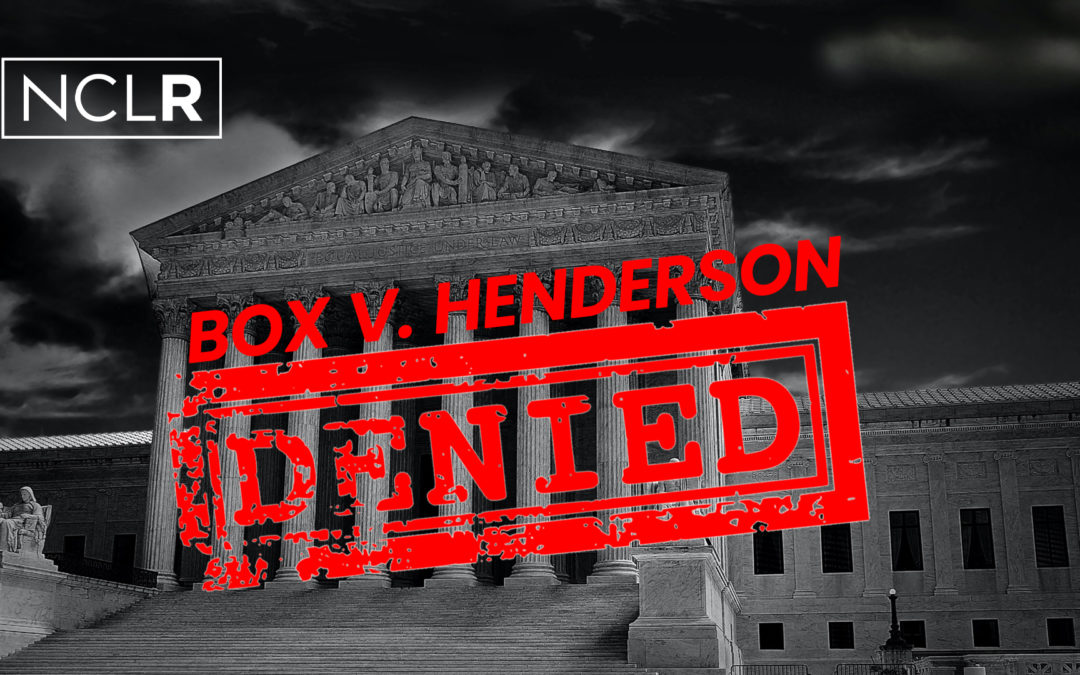FOR IMMEDIATE RELEASE
December 14, 2020
CONTACTS:
Christopher Vasquez, NCLR Communications Director
415.365.1337 | cvasquez@nclrights.org
WASHINGTON, DC – Today, the United States Supreme Court denied a Petition for Certiorari in Box v. Henderson, a case out of Indiana about the state’s obligation to recognize same-sex spouses and different-sex spouses equally on their children’s birth certificates.
“We are so happy for our clients, and other same-sex parents and their children in Indiana, who can finally breathe a sigh of relief that they will continue to be recognized families on their children’s birth certificates,” said Cathy Sakimura, NCLR Deputy Director and Family Law Director (she/her). “The Supreme Court rightly denied this case because it has already clearly decided that same-sex spouses and different-sex spouses must be treated equally.”
When Indiana began allowing same-sex couples to marry in 2015 after the Supreme Court recognized that same-sex couples have a right to marry in Obergefell v. Hodges, the Indiana Department of Vital Records refused to place same-sex spouses on their children’s birth certificates as they do for different-sex spouses. Eight female same-sex couples who conceived children through sperm donation sought the right to be recognized on their children’s birth certificates in federal court.
In 2016, the federal District Court for the Southern District of Indiana ordered the state to begin placing the spouses of people who give birth on their children’s birth certificate regardless of the gender of the spouse. The state of Indiana appealed to the Seventh Circuit, which in January 2020 upheld the ruling and ordered the state to treat same-sex and different-sex couples equally, noting that Obergefell v. Hodges required this equal treatment and that the U.S. Supreme Court had also specifically required states to place same-sex spouses on birth certificates according to the same procedures available to different-sex spouses in Pavan v. Smith.
The state of Indiana filed a Petition for Certiorari, asking the U.S. Supreme Court to consider the case in June 2020. The Supreme Court denied their Petition on December 14, 2020, upholding the Seventh Circuit’s opinion that Indiana must list same-sex spouses on their children’s birth certificates in the same manner that it does for different-sex spouses.
“By declining Indiana’s petition, the Supreme Court affirmed Obergefell and the requirement that states must treat married same-sex couples equally,” said NCLR Legal Director Shannon Minter (he/him). “The Court has ruled on this issue twice before, first in Obergefell, which included a married lesbian couple from Tennessee who obtained a district court order requiring the state to list both women on their child’s birth certificate, and again in Pavan v. Smith, in which the Court summarily reversed a decision by the Arkansas Supreme Court permitting the state to exclude a birth mother’s female spouse from a child’s birth certificate. Thankfully, the Court has let these decisions stand and declined Indiana’s invitation to revisit this settled law. Marriage equality is and remains the law of the land.”
“Thank you to the incredible clients for their bravery and perseverance in this case, and to Indiana counsel Karen Celestino-Horseman, along with Raymond Faust, Richard Mann, and William Groth, who brought this case over 5 years ago,” said Cathy Sakimura. “Thank you also to Ropes & Gray LLP’s Supreme Court team for joining the NCLR and the Indiana counsel before the Supreme Court.”
NCLR, along with Ropes & Gray LLP, represented the couples before the U.S. Supreme Court, along with Indiana counsel Karen Celestino-Horseman, Raymond Faust, Richard Mann, and William Groth.
# # #
The National Center for Lesbian Rights (NCLR) is a national legal organization committed to advancing the human and civil rights of the lesbian, gay, bisexual, transgender, and queer community through litigation, public policy advocacy, and public education. Since its founding, NCLR has maintained a longstanding commitment to racial and economic justice and the LGBTQ community’s most vulnerable. https://www.nclrights.org










